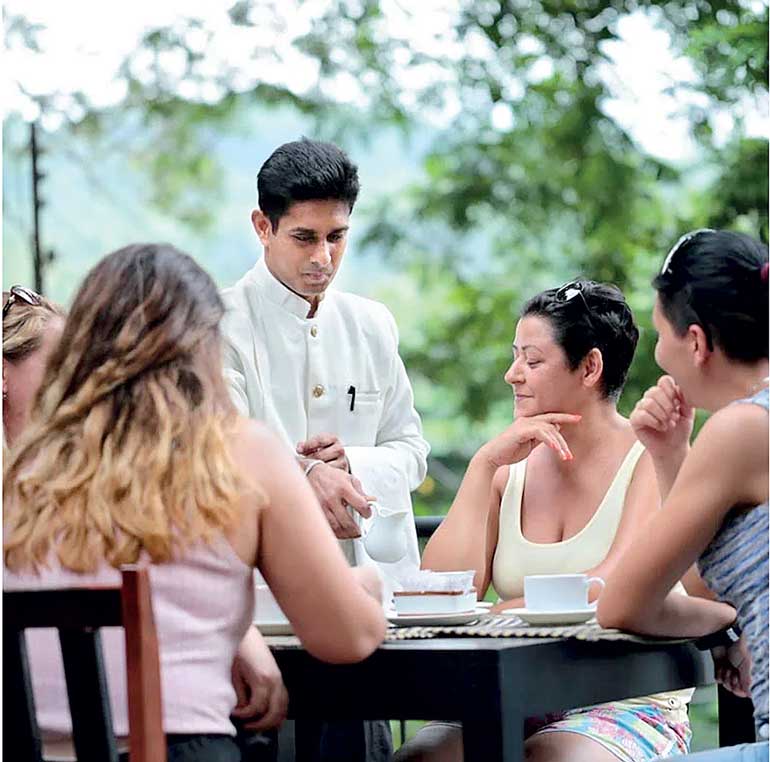Friday Feb 20, 2026
Friday Feb 20, 2026
Tuesday, 15 February 2022 02:33 - - {{hitsCtrl.values.hits}}

Hotels ought to find solutions for all of these without depriving the staff any longer – Pic by Shehan Gunasekara
The Sri Lankan hospitality business flourished during the December festive season. The tastefully dressed lawns and lobbies, the many F&B offerings and Customised Festive Menus brought together to celebrate the season was alluring. Having indulged myself in Colombo’s five-star properties, it was evident that the hospitality sector is currently suffering from lack of skilled labour. The quality of food in most hotels had deteriorated whilst the service received was slow and as I engaged in conversation with the F&B staff, I was made to understand that they were new to the industry or outlet.
Recollecting how local hotels were compelled to retrench their staff, skilled or unskilled, at the peak of the COVID-19 pandemic has paved new avenues for such retrenched employees to pursue whilst others seek employment overseas. Considering the strain these employees would have faced in the past 22 months during the peak of the pandemic with least or no service charge, low wages, and their inability to upkeep their families and livelihoods with the rapidly increasing cost of living, would have undoubtedly navigated them to consider overseas employment, especially in the middle eastern countries.
Recruiting new employees consists of a 100% onboarding cost which ought to be borne by the hotel and hence at this point it is vital for the management of local hotels to think and rethink of retention strategies whilst considering major factors such as increasing the minimum wage rate, appropriate promotions and salary increments, incentives, etc. Failing which, by November 2022 hotels will continue to face this same crisis of unskilled or untrained labour and inability to cope with restaurant covers.
With the pandemic easing out both locally and globally, the tourist arrivals are expected to be on the rise. In the month of December 2021, Sri Lanka was able to attract close to 70 k tourist arrivals which thus far is the highest number of arrivals to record in the year 2021. However, during pre-pandemic times the country was able to attract close to 180 k arrivals for a month on average and this will be the benchmark to look forward to determine whether the country is spearheading towards its normalcy post-pandemic.
Similar to the lack of skilled labour and failure to retain them, the hotels also faced multiple other issues where they struggled during the season with influx of demand to put up the same show what they used to do pre-pandemic. Lack of imported ingredients and spirits with import restrictions and dollar crisis, maintenance issues in both common areas and restrooms due to regular maintenance cycles not followed, short of cutlery and crockery with capital constraints, high food cost and low margins with high food cost and inflation, and same increases not being able to pass down to the customers are other concerns that the hotels will have to sort out in gearing themselves to the future arrivals and meeting demand.
Hotels ought to find solutions for all of these without depriving the staff and their morale any longer as they have been the victims for the last couple of years with the pandemic as they face pay cuts, losing jobs, their livelihoods and having absolutely no service charge throughout the pandemic whilst having to further face a high cost of living which has deteriorated their livelihood in an unprecedented manner.
The pandemic also has got the economy and the organisations to go through a “K” shape recovery which eliminated all the unfit, unstable and non-value adding organisations from the playing fields and made opportunity for the ones who do add value to the economy to do well or rather recover stronger for the future. The same was applicable with the hotel industry and the ones who were able to survive are the ones who can and will add value to the destination in order to attract a higher number of arrivals to the country and the right class of tourist who needs to be attracted as a destination.
With this the hotels will have to reinvent their wheel in order to maintain the right level of cash flows cutting down the waste, retaining its core staff and looking after their wellbeing whilst serving the customers to the fullest through a group of happy staff who could make the customers happy in return and create memorable experience among them to be the raving fans to attract higher numbers as a destination which will help the industry to recover fast and do well. Staff motivation will also assist higher efficiency levels, low attrition and to revive as an industry and a destination to build a better future and an economy which is indeed where the country is looking forward to.
(The writer is a veteran hotelier with a wealth of experience for over 35 years in more than 10 countries around the globe. He currently serves as an external consultant with the Hotel Advisory practice of KPMG Sri Lanka, providing consulting services to leading hospitality and commercial establishments in Sri Lanka. He is a fellow of the Institute of Hospitality, UK (FIH), Fellow CMI, UK, completed GM Program, Cornell University, NY and Hotel Diploma AHMA, USA. He could be reached via email at [email protected].)